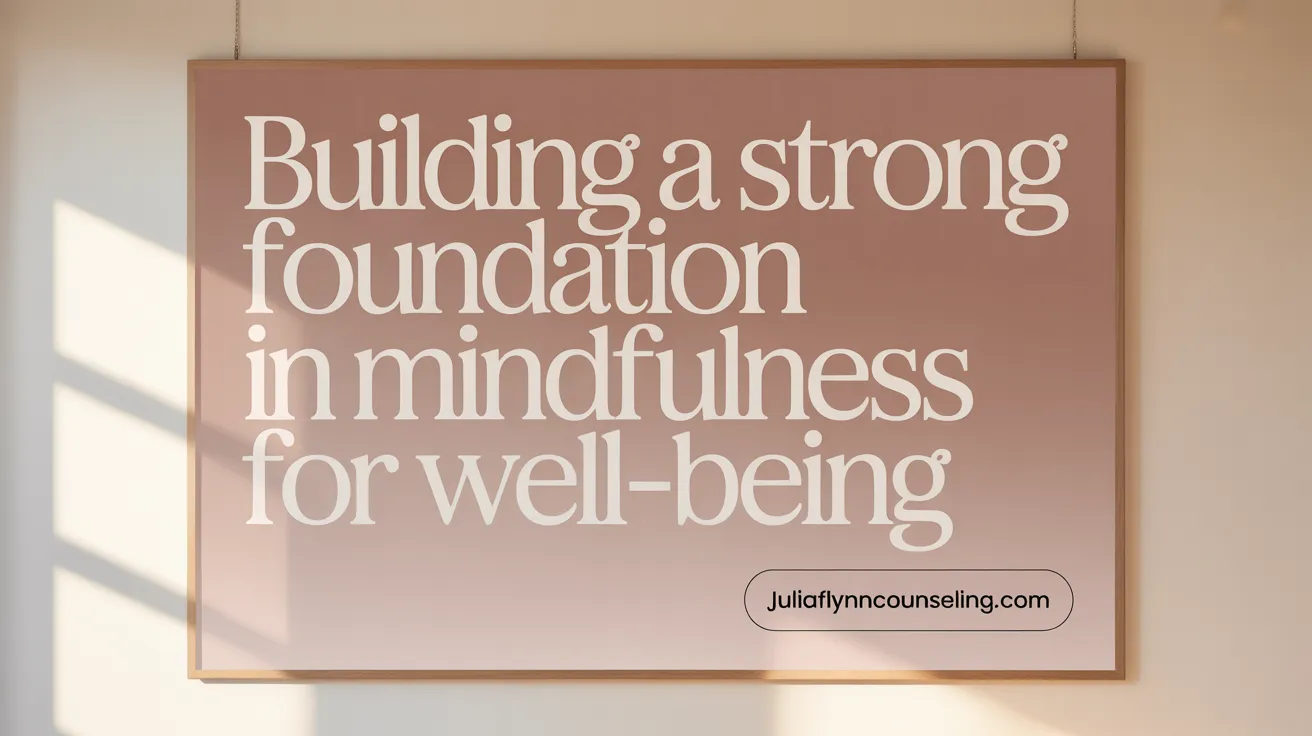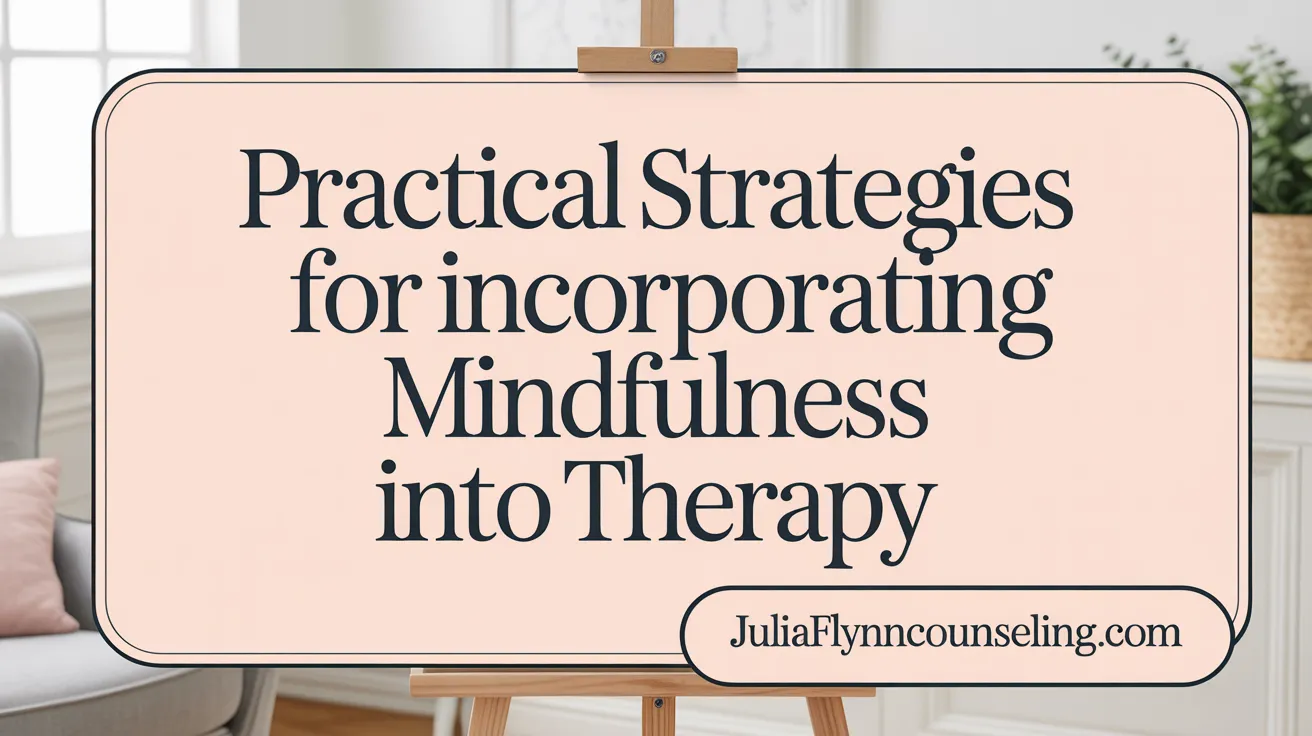Understanding Mindfulness and Its Role in Mental Health
Definition of mindfulness
Mindfulness is the practice of maintaining a moment-to-moment awareness of one’s thoughts, feelings, bodily sensations, and surrounding environment without judgment. It involves paying purposeful, present, and nonjudgmental attention to experiences as they unfold.
Distinction between mindfulness and meditation
While mindfulness and meditation are closely related, they are not the same. Mindfulness refers broadly to a state of active, open attention to the present moment, which can be practiced any time during daily life. Meditation is one specific practice or technique used to cultivate mindfulness, often involving focused attention on the breath, body sensations, or other anchors.
Core elements of mindfulness
Two essential components shape mindfulness: 1) Consciousness and awareness—observing thoughts, feelings, and sensations without trying to control them; 2) Focus on the present moment—gently redirecting attention away from distractions and worries about the past or future while fostering openness and acceptance.
General benefits of mindfulness in mental health care
Research supports mindfulness for reducing stress, anxiety, and symptoms of depression while improving emotional regulation, concentration, cognitive flexibility, and sleep quality. Mindfulness fosters self-compassion, early recognition of emotional distress, and acceptance of thoughts as mental events rather than facts. Its integration into therapeutic practices enhances resilience, empathy, and overall well-being for both clients and clinicians, making it a valuable tool in mental health care.
Foundations of Mindfulness Practice for Mental Well-being

What is mindfulness and how is it defined?
Mindfulness is the practice of moment-to-moment awareness of one’s experience without judgment. It involves focusing attention fully on the present moment and accepting thoughts, feelings, and bodily sensations with openness and acceptance. This means observing internal and external experiences without trying to change or evaluate them, fostering greater self-awareness and emotional balance (Mindfulness and self-awareness, Benefits of Mindfulness).
How does mindfulness differ from meditation?
While mindfulness is a broad state of awareness that can be applied anytime during daily life, meditation is a formal practice designed to cultivate mindfulness. Meditation typically involves focusing the mind on a specific object, such as the breath, a mantra, or physical sensations, helping train attention and promote presence (Mindfulness vs Meditation, Mindfulness meditation).
Components of mindfulness: attention and acceptance
Mindfulness consists of two fundamental elements: attention and acceptance. Attention involves consciously bringing awareness to present sensations, thoughts, and feelings without distraction. Acceptance means observing these experiences without judgment or attempts to control or suppress them. Together, these components reduce reactivity and promote reflective responses to life’s challenges (Self-awareness and self-regulation in mindfulness, Mindfulness and emotional regulation.
Overview of mindfulness techniques
Common mindfulness techniques include breathing exercises, body scans, and mindful movement such as gentle yoga or walking. Breathing exercises focus on noticing the natural rhythm of breath to anchor awareness. Body scans systematically observe sensations throughout the body to cultivate physical presence. Mindful movement integrates awareness into gentle physical activity, enhancing relaxation and attentiveness (Mindfulness exercises, Mindfulness-Based Stress Reduction techniques).
Relationship between mindfulness and stress reduction
Practicing mindfulness has been shown to decrease stress by lowering cortisol levels and reducing negative rumination. It helps individuals recognize early signs of emotional distress, enabling healthier responses and coping skills. Mindfulness encourages stepping out of automatic mental patterns and fosters a calm, accepting stance toward difficult experiences, which contributes to improved mental well-being and resilience (Mindfulness and Stress Reduction, Mindfulness and burnout reduction).
Evidence-Based Mindfulness Interventions in Mental Health Care

What are key mindfulness-based interventions used in mental health?
Mindfulness-Based Interventions (MBIs) primarily include Mindfulness-Based Stress Reduction (MBSR) and Mindfulness-Based Cognitive Therapy (MBCT).
- MBSR is an 8-week structured program that incorporates mindfulness meditation, gentle yoga, and psychoeducation to cultivate present-moment awareness and stress management skills.
- MBCT combines mindfulness practices with cognitive-behavioral therapy techniques, designed especially to prevent relapse in recurrent depression but also helpful for anxiety and general stress.
Both rely on developing nonjudgmental awareness and acceptance of thoughts, emotions, and bodily sensations as described in Mindfulness-Based Cognitive Therapy.
How effective are mindfulness-based interventions compared to other treatments?
Meta-analyses indicate that MBIs consistently reduce symptoms of anxiety, depression, and stress with effect sizes superior to non-evidence-based approaches like supportive therapy or health education.
Notably, studies find that MBIs are comparable to cognitive-behavioral therapy (CBT) regarding efficacy in treating these conditions, according to research on MBIs vs Cognitive-Behavioral Therapy (CBT).
MBCT provides an added advantage in preventing depression relapse by promoting a shift from reactive responses to reflective awareness as described in MBCT and depression relapse prevention.
What are the common adaptations and delivery formats for mindfulness programs?
MBIs have been adapted to suit diverse needs and settings including:
- Group sessions
- Individual coaching
- Online or app-based programs
- Retreats and abbreviated course formats
These flexible formats help increase access and support ongoing daily mindfulness practice as highlighted in Mindfulness-Based Interventions (MBIs) overview.
The integration of mindfulness in mental health care offers evidence-supported tools for emotional regulation, resilience, and improved quality of life, complementing traditional therapeutic methods like CBT (Mindfulness impact on healthcare practitioners, Mindfulness in counseling).
Practical Mindfulness Techniques for Clients and Therapists

What practical mindfulness techniques can be incorporated into mental health care?
Mindfulness techniques that can be effectively utilized in mental health care include mindful breathing, body scan meditation, mindful coloring or drawing, mindful eating, and walking meditation. These exercises encourage focusing attention on present sensations and experiences with openness and without judgment, fostering self-awareness and emotional balance.
How are mindfulness techniques integrated into therapy sessions?
Therapists often introduce mindfulness formally by guiding clients through exercises like mindful breathing or body scans at the beginning of sessions to establish calm and presence. Informally, mindfulness can be woven into conversation by encouraging clients to notice their thoughts or bodily sensations during discussions, enhancing emotional regulation and reducing rumination (Mindfulness-Based Interventions (MBIs) and therapy techniques).
How does mindfulness support mental health?
By cultivating present-moment awareness, mindfulness helps clients recognize and accept their emotions without reactivity. This supports emotional regulation and counters unhelpful repetitive thinking patterns, contributing to reduced anxiety and stress levels (Mindfulness and mental health benefits. For therapists, practicing mindfulness enhances empathy, presence, and resilience, which benefits the therapeutic relationship (mindfulness for therapist empathy and compassion).
What resources are available for mindfulness practice?
Clients and therapists can access mindfulness support through various resources, including smartphone apps like Calm or Insight Timer (Mindfulness apps and guided meditations), online guided meditation programs, and structured courses such as the Mindfulness-Based Stress Reduction (MBSR) program details. These resources provide accessible, evidence-based tools to incorporate mindfulness into daily life and clinical practice (Mindfulness courses and books.
Mindfulness Benefits for Mental Health Professionals and Therapeutic Relationships

How does mindfulness practice benefit mental health therapists?
Mindfulness practice offers substantial benefits for mental health therapists, notably reducing stress and burnout that are common in their profession (Mindfulness benefits for nursing students, Therapists practicing mindfulness). Engaging in mindfulness helps therapists cultivate greater empathy and compassion, which enhances their ability to connect meaningfully with clients (Mindfulness impact on therapist empathy and compassion, Mindfulness to improve therapist empathy). This improved presence fosters stronger therapeutic alliances, which are crucial for therapy success (Mindfulness to strengthen therapeutic alliance.
How does mindfulness improve therapist empathy, compassion, and presence?
Regular mindfulness enhances therapists' self-awareness and emotional regulation, promoting nonjudgmental acceptance of their own experiences and those of their clients (Self-awareness and self-regulation in mindfulness. Such qualities underpin greater empathy and compassion in therapeutic interactions (Mindfulness for therapist empathy and compassion. Mindfulness practices encourage therapists to remain fully present during sessions, improving attentiveness and attunement to client needs (Present moment awareness techniques.
Impact of therapist mindfulness on therapy effectiveness and client outcomes
Therapists who maintain mindfulness practices tend to demonstrate improved therapeutic outcomes (Mindfulness enhancing therapeutic outcomes. Research suggests their clients perceive treatment as more effective and report symptom reductions (Mindfulness impact on therapy clients. Mindful therapists are better equipped to manage their reactions and provide calm, focused support, improving the overall therapy experience (Mindfulness-based counseling techniques.
Training and ongoing practice necessary for integration into clinical work
To fully integrate mindfulness into clinical work, therapists require proper training and commitment to ongoing personal practice (Training for mindfulness clinicians. Structured mindfulness programs and workshops can build foundational skills, while regular practice ensures these skills translate into therapeutic competence and resilience in clinical settings (8-week MBSR program, Mindfulness training in therapy.
Targeted Self-Care Using Mindfulness in Mental Health Care
How can mindfulness be used in targeted self-care for mental health?
Mindfulness plays a vital role in targeted self-care by encouraging a holistic approach known as PEMSS, which stands for Physical, Emotional, Mental, Spiritual, and Social care. This framework guides individuals to honestly evaluate their diverse needs in these interconnected areas, promoting balanced well-being.
By practicing mindfulness, one can develop deeper self-awareness to detect early signs of stress and burnout. This awareness enables individuals to ask targeted questions about what aspects of their physical health (like rest and exercise), emotional state, mental focus, spiritual grounding, and social interactions require attention. (Assessing and addressing burnout
Implementing self-care mindfully also involves setting clear personal boundaries. This protects energy and time, prevents overwhelm, and allows for prioritizing activities that genuinely support individual well-being rather than engaging in untargeted or draining tasks.
Furthermore, nurturing mindful social connections enhances resilience and mental health. Being present in interactions and cultivating compassionate communication helps strengthen support networks, which are critical for coping with stress and maintaining emotional balance. (Enhancing social connections for well-being
By integrating mindfulness with the PEMSS approach, individuals create personalized self-care routines that address the root causes of stress, prevent burnout, and foster overall resilience. (Mindfulness strategies for self-care
| PEMSS Area | Mindfulness Role | Benefit |
|---|---|---|
| Physical | Awareness of bodily needs | Improved health and energy |
| Emotional | Recognition of feelings | Enhanced emotional regulation |
| Mental | Observation of thoughts | Reduced rumination and increased focus |
| Spiritual | Connection with deeper values | Greater acceptance and peace |
| Social | Mindful presence in relationships | Strengthened support and resilience |
Considerations and Limitations in Mindfulness Practice for Mental Health

Are there any limitations or risks associated with mindfulness practice?
While mindfulness offers numerous mental health benefits, it is not without limitations or risks. For some individuals, especially those with recent bereavement, severe mental health challenges such as mania, self-harm tendencies, suicidal thoughts, or ongoing psychological treatment, mindfulness practices may trigger adverse reactions. These can include increased anxiety, dissociation, nightmares, hypersensitivity, or flashbacks. For more on potential adverse effects of mindfulness, see relevant comprehensive guides.
Importance of trauma-informed approaches
Given these potential risks, trauma-informed care is crucial when integrating mindfulness into therapeutic settings. Mental health professionals should carefully assess individual histories and current conditions to adapt mindfulness practices appropriately, preventing harm and avoiding the triggering of traumatic memories. Research emphasizes mindfulness enhancing therapeutic relationships and the importance of tailored approaches.
Consideration of individual suitability and professional guidance
Mindfulness should be approached as a continuous, skill-building practice rather than a quick remedy. Before beginning mindfulness exercises, individuals are encouraged to seek professional guidance, especially if they have pre-existing mental health concerns. Tailoring mindfulness to one’s unique needs ensures safety and maximizes therapeutic benefit. Resources on how to practice mindfulness for mental health provide practical advice and support.
Mindfulness as a continual practice rather than a quick fix
Mindfulness fosters self-awareness and emotional regulation over time through consistent practice. Immediate results should not be expected, as cultivating mindfulness is a gradual journey toward improved mental well-being and resilience. For insight into mindfulness as a daily practice and its benefits, see detailed guides.
This balanced understanding promotes safe, effective use of mindfulness as part of a comprehensive mental health strategy.
Integrating Mindfulness with Personalized Therapy at Julia Flynn Counseling
How is mindfulness incorporated into personalized mental health care at Julia Flynn Counseling?
Julia Flynn Counseling takes a personalized, evidence-based approach to mental health care by integrating mindfulness into various therapeutic methods. Mindfulness is woven into therapies such as Cognitive Behavioral Therapy (CBT) and Compassion Focused Therapy, helping clients cultivate present-moment awareness and emotional regulation.
The practice emphasizes empowering clients through increased self-awareness and the ability to recognize and change thought patterns and behaviors. By delivering therapy sessions online through a secure HIPAA-compliant platform, clients can engage mindfully from the comfort of their own homes, creating a safe and focused environment for therapeutic growth.
This integration allows for flexible and accessible mental health support that fosters mindfulness as a tool to manage symptoms of depression, anxiety, and other challenges. Julia Flynn Counseling’s approach underscores the importance of tailoring mindfulness techniques to individual needs, enhancing the overall effectiveness of therapy.
The Future of Mindfulness in Mental Health Care
Growing Evidence Supporting Mindfulness Benefits
Mindfulness continues to gain strong support as an effective approach in mental health care. Research consistently links mindfulness practices with reduced symptoms of anxiety, depression, and stress, along with improvements in emotional regulation and cognitive function. These benefits affirm mindfulness as a valuable tool to enhance overall client well-being.
The Need for Continued Research on Mechanisms and Best Practices
Despite promising outcomes, there remains a critical need for ongoing research to clarify how mindfulness precisely affects brain function and psychological processes. Understanding these mechanisms will help refine interventions and determine best practices for diverse client populations.
Importance of Individualized and Trauma-Informed Mindfulness Integration
Mindfulness is not a one-size-fits-all solution. Its integration into therapy must be tailored to individual needs, especially considering the potential risks for those with trauma histories. Trauma-informed approaches ensure mindfulness is applied safely and effectively, preventing adverse reactions.
Potential to Enhance Client Well-being and Therapist Effectiveness
Mindfulness benefits extend beyond clients, aiding therapists by reducing burnout and increasing presence, empathy, and self-compassion. When incorporated thoughtfully, mindfulness enhances therapeutic relationships and contributes to improved mental health outcomes across care settings.
